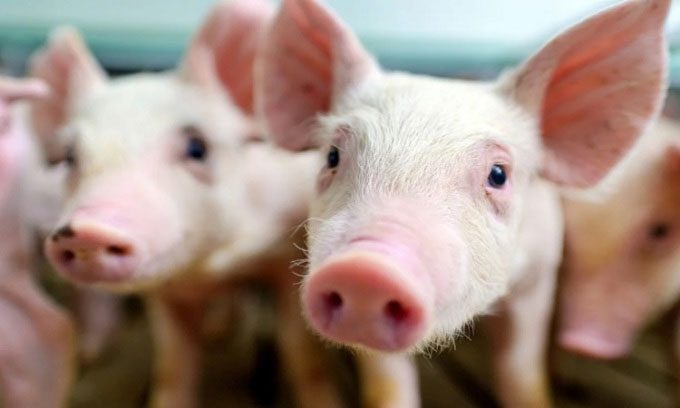For the first time, a group of scientists in China has successfully grown human cells within pig embryos, promising a potential solution for organ transplantation.
The research team at the Guangzhou Institute of Biomedical and Health under the Chinese Academy of Sciences published their findings in the journal Cell Stem Cell on September 7, highlighting the potential of organ cultivation for transplantation and research in pigs. According to China Science Net, this marks the first instance of human organs developing inside another species.

Organs grown in pig embryos contain 50 – 60% human cells. (Photo: SCMP).
The kidney is one of the most commonly transplanted organs. However, the shortage of donor kidneys poses a significant challenge in providing healthy organs for recipients. Growing human organs in large mammal embryos could offer a groundbreaking solution to this issue. Lai Liangxue, a co-author of the study, explained that their method involves introducing human stem cells into the host tissue, which enhances the nurturing of human stem cells within the embryos.
Out of more than 1,800 embryos used in the study, five successfully developed without degeneration. These embryos nurtured kidneys containing 50 – 60% human cells. Due to ethical considerations and the risk of embryo degeneration, the gestation was halted at 28 days. The research team employed the CRISPR gene editing tool to target two kidney development genes and limit the growth of pig cells. Dai Zhen, a member of the research team, noted that this created space in the pig embryo, allowing for human cell development.
A significant concern when creating hybrid embryos (embryos containing both human and pig cells) is the possibility of human cells contributing to the pig cell lineage. Human cells were found in the brain and spinal cord of the embryos, but they did not exist around the genital ridge, indicating that human cells did not integrate into the reproductive cells of pigs. Darius Widera, a professor of stem cell biology at the University of Reading in the UK, commented that this research represents a major milestone, but the discovery of human cells in the brain of the embryos raises “important ethical questions.”
According to the study, this issue could potentially be overcome by removing the genes responsible for the development of specific cell lineages, though this would also affect the kidneys. The paper also identifies other challenges such as the large number of degenerated embryos in the experiment, the risk of organ rejection due to cell type differences, and various issues that may arise if the embryos were to exist for a longer duration.
The research community is actively working to address the shortage of organs. Gene editing could prevent the expression of genes that lead to rejection, according to the Langone Medical Center at New York University (NYU). Last year, doctors at NYU successfully transplanted a pig kidney into a brain-dead patient with only one gene modification. The organ continued to function for 32 days post-surgery.


















































